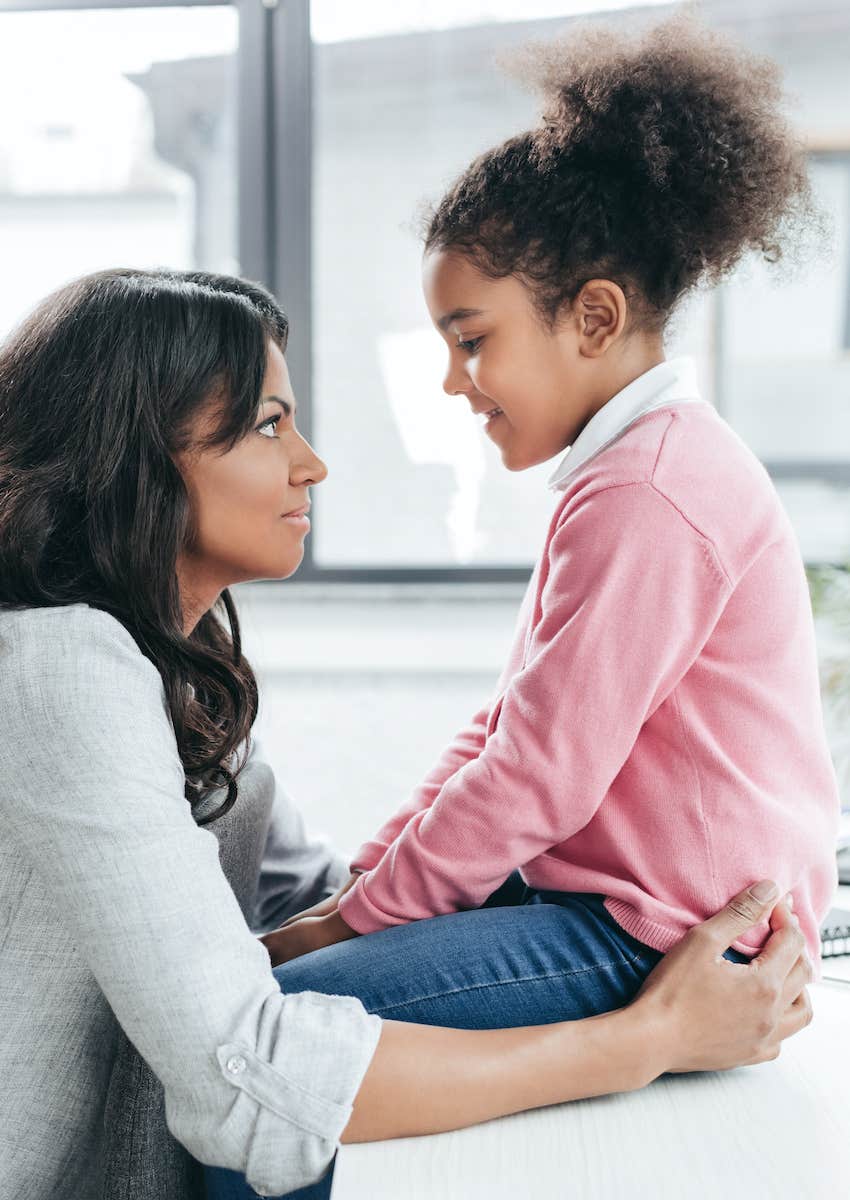5 Transformative Things I Wish I'd Told My Divorced Mom When I Was A Kid
Your children remember you were there for them and you did your best.
 alessandrobiascioli | Canva
alessandrobiascioli | Canva My parents divorced when I was eight years old. My father told me he would have stayed if my mother had only tried. My mother told me that was all she ever did.
For many years, finding out “the truth” mattered to me. I wanted someone to blame. Sometimes, that person was my father. Sometimes, that person was my mother. Other times, it wasn’t a person but the idea of love itself.
For half my childhood, my divorced mom raised me and my three siblings. We survived on her bookkeeper salary and the child support check my father sent (mostly) every month. As a teenager, it was easy to believe in the way most teenagers do that I knew best.
That if I were my mother, I would do it all differently.
Now I'm only a couple of years older than my mother was when she married my father, and I’m not so sure. Her shoes fit more comfortably.
RELATED: 10 Ways Life After Divorce Is So Much Better (Really!)
Here are 5 things I wish I could have told my divorced mom when I was a kid.
1. It’s better to lean into your pain together than hide it away.
My mother’s optimism has always impressed me, but her optimism is something that I now, as an adult, see in myself as something else: a mask. In other words, my mother was good at faking it. When I was growing up, we both faked it for the same reasons.
I was a good student who read books, stayed out of trouble, and faded into the background. I said “Fine” when she asked how I was doing instead of saying how sad or lost I felt. I developed a sort of apathy and tried to unburden my mother.
To take one more thing — raising me — off her plate, so in many ways, my siblings and I raised each other. In doing so, I’m afraid we may have made my mother feel like we didn’t need her, which could not have been further from the truth.
Optimism is a mask that’s hard to keep on forever. Hiding becomes a habit that’s hard to break, further isolating you from your loved ones, and turning to substances like alcohol to cope is all too easy. That’s why it’s so important to find a support group outside your usual social circles — women who understand your situation because they are going through it too or have already been there.
Wanting to “be strong” for your children is understandable, but needing help is nothing to be ashamed of. Knowing when to ask for help is a crucial lesson for your children.
2. As a divorced mom, your relationship with money will change, and that’s OK.
Because my mother never remarried and had no college degree, finances were often a struggle. Little luxuries, like attending ballet lessons, disappeared. We stopped bringing lunch to school and instead began typing our ID numbers into keypads in the cafeteria while women wearing hair nets discreetly pointed out what food the government would pay for and what food they would not.
Then it got worse — my mother explained how we were losing the house. The car went missing from the driveway one night, and again, my mother explained, only this time we learned what a repo man was.
My mother was drowning. If I mentioned anything to my father, he’d mumble something about child support, and the conversation would quickly shift to a diatribe of all the ways my mother was failing us.
My mother was not failing us. She was not alone, and neither are you.
According to data released by the US Census Bureau, 35.6 percent of households led by single moms live below the poverty line.
Even today, when articles rethink the value of a college degree seem prevalent, the impact having a bachelor’s degree has on your earning potential can’t be ignored.
In 2023, the Bureau of Labor Statistics reported that the median weekly paycheck of someone with a bachelor’s degree was $715 more than someone with a high school diploma.
But, if you’re drowning in debt and stretched thin like my mother was, attending college likely seems out of reach. Single mothers might be surprised to find out there are often more resources available than they think. If you’re a divorced mom, you can also take advantage of online finance education geared toward women where you can learn about budgeting, paying off debt, and saving.
3. There’s a line between honesty and therapy.
I grew up in a house full of women (and one little brother, poor him) who loved to talk. We prided ourselves on our ability to be honest with each other. Even so, as a child, if I overheard my mother or anyone else speak poorly of my father, I took it upon myself to personally defend his honor. I didn’t condone his actions, but he was my father, and I loved him. That was that as far as I was concerned.
After the divorce, I saw my father often. He took us to see movies and let me wander libraries and bookstores while he distracted my little brother. He listened to me, and I could tell he thought I was smart.
That kind of thing mattered to me. But I wasn’t going to stay little forever. Sometimes, I’d come home to my mother and vent, and the floodgates would open. We became co-victims of my father’s transgressions.

Photo: LightField Studios via Shutterstock
The phrase “talk it out” exists for a reason. Many of us feel better after a good talk with someone who gets it. But after divorce, relationships with friends and family can feel strained. Children usually understand the events that led to a divorce even if they can’t articulate everything they heard and saw, so it’s easy for parents to overshare.
A common complaint I’ve heard from other children of divorce is how their parents treated them (and often still treat them) as messengers or as therapists. But your children’s father will always be a part of their lives, even if he ceases to be part of yours.
Instead of creating a wedge between your children and their father, use divorce as a lesson in setting personal boundaries, forgiving others, and loving someone despite their imperfections. If you vent to your children, do your best to bite your tongue and speak to a friend or professional instead. Let your children form their own opinions about who their father is or isn’t.
4. Your children need a parent, not a friend.
As I got older, I became my mother’s confidant. The person she could talk to without judgment. Children in this position often begin to see their parents as their equals.
The dynamic will grow worse if you struggle to discipline or provide structure for your children. Do they have chores? Do they have a curfew? Do you ask about their day, or review homework together? When mistakes are made and tantrums are thrown, how do you teach your children?
After a divorce, the instinct to “do it all yourself” can be so tempting. You come home tired after a long work day. Barking orders at your children or ticking domestic tasks off your to-do list seems impossible. So you let things slide.
But when your kids start to think of you as the parent “who lets things slide,” that’s when you have a problem. You become the cool adult friend they happen to live with instead of their parent.
5. It's still important to create family moments.
I have so many happy memories, even after the divorce, but I also remember how, as we grew older, our daily lives grew more fragmented. My mother was (and still is) fun. She liked to garden and do DIY projects, anything from rehabbing furniture to making lotions and lip balms from scratch.
She cooked constantly and never from a recipe. I loved helping her. I’d ask her how much seasoning to put in a dish, and the reply was always the same: “Trust your gut.”
These things brought us together. Later, we often retreated to our bedrooms after school, where I’d read a book or my brother would play video games. I felt nostalgic for a past I knew I couldn’t get back.
It’s important to continue traditions and begin new ones — to have family dinners, to host game or movie nights. To remind your children that the end of a marriage isn’t the end of their world.
As a divorced mom, it’s important to continue traditions and begin new ones—to have family dinners and to host game or movie nights. To remind your children that the end of a marriage isn’t the end of their world.
You can’t control everything that happens after divorce. What your children will remember more than anything is that you were there for them and that you did your best for them. Show your children that you can fail and keep going.
How what’s worse than making a mistake is not learning your lesson. I remember how much my mother tried more than I remember her failures. More than anything, this is what I’d tell her; it’s what I do tell her.
Liza Caldwell runs SAS for Women, a boutique firm that specializes in helping women free themselves from dysfunctional and unhappy relationships.

